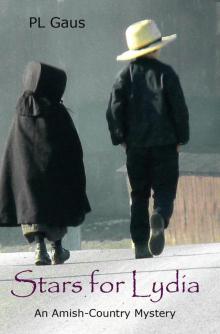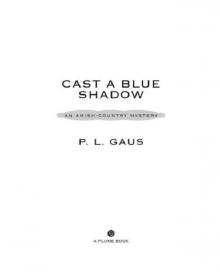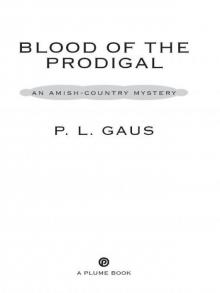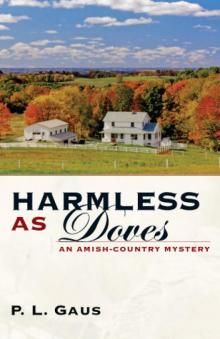- Home
- P. L. Gaus
Stars for Lydia Page 2
Stars for Lydia Read online
Page 2
“What can they do, Mike?” Cal asked. “You’ve had your museum in place for decades.”
“Don’t know,” the professor said. “Look, Cal. Lydia Schwartz spoke to me after class. I thought she had a good first year while we were on Sabbatical. I didn’t see much of her last year. But she’s troubled about something now.”
“Haven’t heard anything,” Cal said.
“Who would know?”
“Ed Schell, I imagine,” Cal said. “They’ve been helping her make the transition out of Amish culture.”
“I know him pretty well,” Branden said. “It was the Schells who first introduced us to Lydia.”
Caroline said, “Light-Path Ministries, right? They have a church.”
“Yes,” said Cal. “Light-Path. Ed and Donna Schell. They help people who want to leave an Amish sect.”
“That’d take a lot of help, I expect,” Caroline said.
“Everything,” Cal agreed with a nod. “Checking accounts and credit cards. Utility bills and driver’s licenses. Budgeting, groceries, clothes and legal matters. Amish people sometimes need help with everything about modern life. Especially if they come out of one of the conservative churches. Like Lydia Schwartz. From the Schwartzentruber sect.”
“Well, I’m worried about her,” the professor said. “She was talking about slave babies and Amish babies as if the two belonged in the same sentence.”
- - - - - - - - - - - - - - -
Later in the afternoon, the professor edited a rough draft of an article he was submitting to The Journal of the American Civil War. He also held meetings with two students. At 3:00, Branden taught his second class, on nineteenth-century American history. At 4:00, he met with an assistant professor new to the history department.
At 4:30, he retrieved his small white pickup truck and drove down off the college heights, to the old red-brick jail on courthouse square. He parked in the bank’s parking lot just south of the jail, and he climbed the worn concrete steps into the back of the jail, just as the out-rigger clouds of another late-summer storm began to slide in from the west.
Down the long first-floor hallway, past the busy squad room on the left, Branden entered Sheriff Bruce Robertson’s office at the front of the jail building, and without greeting the rotund sheriff, he took a bottle of water at the credenza behind the office door, and he slumped into a low leather chair in front of Robertson’s battered cherry desk. Legs stretched out in front of him, Branden sipped at his water and contented himself with the simple luxury of sitting together in silence with his old friend, Holmes County’s irascible top lawman, sometimes inscrutable, sometimes impulsive, and always as large and indelicate as a bull dozer.
Rain began to pelt the west facing windows, and thunder broke immediately behind an overhead lightning strike. With his sizeable belly pressed tightly against the edge of his desk, Sheriff Robertson cast a moment’s glance to the advancing storm outside his windows, and then he continued to shuffle papers back and forth mechanically on his desk.
He was sporting a full and bushy gray beard, which everyone knew covered the long scar on his left cheek, a ragged battle wound that he had earned in the fight with old Earnest Troyer, near the conclusion of the search for Fannie Helmuth, at the end of summer, a year ago. The sheriff’s hair was also gray, and it was cut with his customary Korean War flat-top style, which made him look, with his eyes weary from the day’s paper grind, like a fifties-era state trooper who had been out on traffic patrol too long. Except that now he wore a beard, covering a scar that lay beneath it.
Robertson worked with his papers at his desk, sighing occasionally with an end-of-the day boredom. He edited some of the papers and gave his signature to others. As he worked, he sorted the papers into the various document trays on his desk, and without looking up, he said simply, “Mike,” to acknowledge the professor.
“Bruce.”
“First lectures?”
“Went fine.”
“You get caught in this storm?”
“No.”
“New president?”
“Yes.”
“She any good at it?”
“I suppose.”
A long, multiple flash of lightning strikes lit the windows to the sheriff’s left, and thunder rumbled forward as the light of day was wrangled down to a dim and desultory gray.
“You seem distracted, Mike. Are you down here for a reason?”
“Lydia Schwartz. One of my students. Do you know her?”
“No. Why?”
“I’m worried about her.”
“I don’t know her, Mike. She hasn’t been through here.”
“Then do you know Ed Schell?”
“Light-Path,” the sheriff said. “Sure. He’s something of a fixture down here. Tries to help the Amish kids who get arrested. Why?”
“Cal says the Schells have been helping Lydia Schwartz.”
“You were down at Duke when she started college?”
“Yes, and I didn’t see much of her last year. Was she any trouble for you here?”
“No. Schwartz?”
“Yes, Lydia Schwartz.”
Robertson shrugged his shoulders. “Ed Schell is easy enough to find.”
“I know. Church on Perkins.”
“Yes, and a boarding house. They came here from Ashland. About a year before you left for your lay-about sabbatical at Duke. What’d you do there, anyway? Stretch out on a sofa and think deep thoughts?”
“I was buried most days in their Civil War archives, Bruce. I worked. Wrote several papers.”
“Right,” Robertson replied with a grin.
“Knock it off, Sheriff,” Branden complained.
The sheriff’s old intercom buzzed, and Del Markely, his dispatcher, spoke abruptly. “Sheriff, there’s a problem. You need to hear this.”
Just as abruptly, Del switched off. Robertson made a curt reply into his old intercom box, but Del did not answer. So, Robertson pushed out of his chair, advanced to his door, and turned left into the hallway, with the professor trailing behind. At Del’s front counter, Robertson asked, “What?” and Del Markely, up on her feet, held her microphone out, and pointed to her radio receiver on the consoles behind her counter.
“Say again, Ricky,” she said into her microphone. “The sheriff’s standing right here.”
Over the radio speaker, they heard Ricky Niell’s anxious voice. “We’ve got a body, Del. It’s a young Mennonite woman in a lavender dress. North on County Road 77, then west on Township 606. On a Schwartzentruber farm.”
Chapter 3
Monday, August 28
5:20 PM
After Ricky Niell’s call came in at the sheriff’s office, Branden rode anxiously with Robertson in the sheriff’s dark blue Crown Vic, north and east out of Millersburg through the rural countryside, on the winding black-topped, two-lane SR 241. The professor watched in a mournful daze as Robertson negotiated the slow, sharp left turn in the tiny livestock auction berg of Mt. Hope and then drove north on County 77, into Holmes County’s northern nowhere-from-anywhere farmland. They proceeded west on black-topped Salt Creek 606, just as the sudden afternoon’s storm had moved off to the east. Once they had turned onto 606, the professor’s mind seemed to function rationally again. He knew what was coming, and he had managed, in at least a superficial way, to acknowledge it. This was Schwartzentruber country. This was the farm across the road from Lydia’s parents. This was going to be Lydia Schwartz. ‘Please,’ the professor prayed silently. ‘Let it not be Lydia.’
After a scant three-quarters of a mile, Robertson came up to Ricky Niell’s cruiser at the top of a hill. The vehicle was still pulsing its red and blue flashers on its light bar. Ricky had parked at the edge of a weedy culvert that was running high with rain water, beside a farmer’s muddy lane.
The long and wide lane was fenced down each side with knarred post stumps and rusty wire, and it traced off through a field of tall green corn, toward a dense stand of trees, shot th
rough with the white and gray trunks of tall-canopied Sycamores, three hundred yards to the back of the property. In the windy remnants of the storm, the tall Sycamore canopies were still bending and swaying erratically. Blue sky and large cotton-ball clouds had begun to replace the gray mantle that had blown over the county only a half-hour earlier. The professor took it all in mechanically. He saw, without really seeing. His emotions were a mixed flood of anxiety and worry. He was scratching nervously at his chin whiskers, and he had been shifting side-to-side on his seat, trying to dispel a mental numbness that had overtaken him.
As Robertson pulled his Crown Vic onto the lane, Branden spoke quietly. “This is the Yost farm, Bruce. John and Mary Yost. Ultra-conservative Amish. Schwartzentrubers. I’m afraid this will be my student Lydia. Mary Yost is her sister. Lydia is the only one out here who would be dressed in Mennonite attire.”
Robertson proceeded slowly, steering carefully around mud puddles and negotiating high spots where he could manage it. But despite his best efforts, the Crown Vic dipped and slid into the ruts left by ancient iron wagon wheels. “How do you know these Yosts, Mike?” the sheriff asked, trying to distract the professor from his emotional turmoil.
“Mary Yost is the mother here,” Branden said woodenly, as they approached the back of the lane. “She is Lydia’s older sister, and Lydia has been trying to get in touch with a Mary. I think it’s this Mary. Mary Yost, her sister on this farm. Sorry. I must not be making much sense. I don’t want to believe this is Lydia.”
“You’re projecting, Mike,” Robertson said as he inched along. “It might not be her. You don’t know yet.”
“I’m nervous. She was in a lavender dress this morning. Anyway, listen. This is the greeting on her phone. I first heard it when I called her this morning after class.”
As the sheriff nudged and slipped his Crown Vic along the muddy lane, the professor tapped in a number and played out Lydia Schwartz’s iPhone greeting on the speaker:
“Mary, if this is you, please, please, please come up to campus.
Call me, or just come see me before you do anything.
OK? Don’t do anything until you talk to me.
Anyone else, just leave a message.”
“She must have revised it since this morning,” Branden said. “It sounds more urgent, now.”
Robertson turned left around the bend in the farm lane, and Detective Ricky Niell came into view. His gray suit coat was hanging limp and wet from his shoulders. He was standing beside a small red Escort, where a narrow bridle path snaked through the woods and intersected the muddy lane. Two forensics technicians waited beside the ME’s van, and on the path, ten yards into the timber, Missy Taggert, the Holmes County Medical Examiner and Sheriff Robertson’s wife, stood with a rain-drenched English woman who was dressed in muddy jeans and a blue-checkered work shirt. In green hospital scrubs, Missy came away from the English woman and walked in her clear plastic rain slicker up to the Crown Vic as the sheriff and the professor were climbing out.
“She fell and hit her head on a rock,” Missy said, brushing the hood of the slicker back from her head. “I have her phone. And a wallet from her purse in that red Escort. Lydia Schwartz. College student.”
- - - - - - - - - - - - - - -
His first sight of the long lavender dress stopped the air from moving inside Professor Branden’s lungs. He stood immobile, several paces back, and he realized that he wasn’t breathing only when the autonomic reflex from his diaphragm dragged a sudden, hasty breath into him. ‘Breathe,’ his chest demanded, and as he filled his lungs, he shook his head for clarity. How can this be? he thought. Is this real? He was washed through with shock and denial, despite the fact that he had anticipated this on the long drive up from Millersburg. As prepared as he was to see it, the sight of Lydia sprawled in the mud put tears in his eyes and a woeful, “Oh no, no, no,” whispering through his lips.
Lydia rested on her side, near the muddy creek that trickled across the bridle path, and her form, deflated and motionless, had the unmistakably flat aspects of death. Her face was as white as the whitest rice, and her body was draped over the rugged ground like a limp rope. Her lace prayer disk lay in the mud beside her head.
Branden stepped sorrowfully back along the bridal trail to the farm lane, and Missy followed him. The English woman in the blue checkered work shirt joined them beside the Crown Vic. “We were caught in the rain,” she said plaintively. “Running down the hill. She slipped in the mud. Just fell right there. There wasn’t anything I could do.”
Robertson held out his hand and said, “Sheriff Bruce Robertson.”
“Meredith Silver,” the woman said, taking his hand. “I’ve known Lydia since she was a kid. Lydia Schwartzentruber. Schwartz. I can’t believe this happened.” Her eyes were wet and swollen. She looked as if she had cried a lifetime of sorrow in the span of the last single hour.
“Are you a neighbor?” the sheriff asked, holding out a bandana for her eyes.
Meredith Silver nodded, took the cloth and dabbed at her eyes. “I live just across the road. First house west of here.”
Meredith gazed back toward Lydia’s body for a long moment. Then, as if forgetting herself, she turned and started back along the farm lane. She stopped and turned back with an apology. “Sorry. Look, I need to get out of these clothes. Into something dry. If you don’t think you need me here, anymore? I’ll be at my house. Everybody out here knows me. Is that OK with you?”
“We’ll have questions,” Robertson cautioned.
“Just come over to the ranch house, Sheriff. Across the road.”
Robertson gave a single nod of his head, and Meredith Silver left along the muddy lane.
Shaking his head, and not paying any attention to Silver, Professor Branden whispered to Missy, “I was talking to her just this morning. After class. I can’t believe this is real.”
Missy led Branden and her husband back to the body. She had rolled the body onto its side. She explained this and said, “She just fell forward, it seems.”
The sight of her was a bleak contradiction to all the Professor’s denials. The professor saw that she was in the same Mennonite clothes that he had seen her wearing after class. There was the long lavender dress, now muddy at the hem, and muddy in front where she had landed. There were the white string ties and a once-white apron. Her long brown hair was spilling out of a loose bun at the back of her head. One arm was spread wide, at right angles to the torso, with an appalling red gash in her temple. And all of her was splattered with mud.
“I turned her a bit,” Missy said, “but she’s lying right where she landed. Fell and didn’t move. Didn’t try to break her fall. Just sprawled out face-first on the ground and struck her head on that rock. It’s like the rain pounded her deeper into the mud and rinsed all the blood away. Her clothes are soaked and muddy. Just like Meredith Silver’s. They were running down the hill in the rain.”
Robertson commented gently to the professor. “You seem to know her more than you would the average student, Mike. If you can, tell us about her. Tell us how you know her. I mean, I know she was your student, but there’s clearly more than that. Who was she?”
Branden managed a weak nod. “I’ve been out here before,” he said, and he heard his words as if there were a cavernous echo in his head. “She’s the daughter of Mose and Ida Schwartzentruber, on the farm across the road. On the other side of 606.”
“OK, but how do you know all of that?” the sheriff asked.
“When Lydia decided that she would leave her sect, Caroline and I offered her one of our scholarships. She passed her G.E.D. exam, and she started college right then.”
“So, you know the families fairly well,” Missy said.
“Yes,” Branden said, “We know them all very well out here. But they blame us for Lydia. They blame us for making it too easy for her to turn away from their church. We gave her a place at the college when she wanted out of the sect. The Schwartzentrubers don’t car
e for us these days.”
Ricky Niell approached on the trail and said, “The ambulance is here.”
The three followed him back out of the woods to the farm lane. Without lights and sirens, the ambulance was approaching slowly from their left.
To their right, a team of two roan Belgian draft horses pulled a ponderous farm wagon forward. The late-teens Yost lad who was driving the horses from the top rail of the wagon was known to Branden as John Junior. Junior pulled his horses to a stop, well back from the Crown Vic and the red Escort. There were five younger children riding in the back of the wagon, aged four to maybe twelve, the professor remembered. They scrambled down from the back of the wagon and clustered themselves beside the tall draft horses to watch the English folk, curiosity on all their faces.
All the youngsters were barefooted. The boys were dressed uniformly in dull-blue Amish denim, with black vests and long-sleeved dark-blue blouses. The girls all wore identical dark plum dresses and black bonnets.
After Junior had climbed down from his perch, stepping first on the iron rim of the wagon wheel and then jumping down to the ground, Branden pulled him several steps forward and away from his brothers and sisters, saying quietly, “There has been some trouble, Junior.”
Junior nodded toward the ambulance, asking, “Somebody’s hurt?”
“It’s your Aunt Lydia, I’m afraid. She slipped on your bridle path. Running down the hill. She hit her head on a rock.”
Stone faced and tense, Junior asked, “Bad?”
“I’m afraid she died,” Branden said. “I’m sorry.”
Junior’s entire body shuddered with the shock of the news. He opened his mouth to say something automatic, but he closed his lips tightly instead, looking first back to his younger brothers and sisters, and then around again to Branden. He shook his head and drew a deep, ragged breath. “Are you sure it’s our Aunt Lydia? I mean, are you sure?” He seemed to be fighting back tears.
Branden said, “Yes. I’m sorry, Junior. It is really her.”
Junior turned around to face his brothers and sisters. He stepped back to them and gathered them close together. He knelt to take the two youngest children, a little boy and a little girl, into his embrace, and he spoke in Dietsche dialect. The youngest boy, three years old, blinked and looked confused. The youngest girl, four years old, stared back blankly at Junior. A middle girl of five filled suddenly with tears, and the two older children, a girl of seven years and a boy of twelve, obviously surprised and shaken, began asking questions of Junior. The questions came rapidly, and Junior stood and tried to embrace them. But one boy pulled away sternly, one girl stepped back from him, and the other boy wrapped his arms around Junior to take his embrace. Speaking to all of them, Junior said in English, “Back to the house now,” and the children began to file toward the back of the wagon, while the oldest of the five continued with a flurry of questions. As they arranged themselves at the back of the wagon, Junior lifted them up onto the flat bed, saying each of their names as he did so. Ana. Rose. Dottie. Jonas. He reached out to take the hand of the fifth, but that boy refused his assistance, and climbed up himself into the wagon. Junior whispered, “Micah,” as if completing the list of his siblings was a necessary formality in his sorrow. Then he climbed up to the reins and said to the professor, “We’ll be back at the house with father.”

 Stars for Lydia
Stars for Lydia Cast a Blue Shadow
Cast a Blue Shadow Separate from the World
Separate from the World Clouds without Rain
Clouds without Rain Blood of the Prodigal
Blood of the Prodigal Whiskers of the Lion
Whiskers of the Lion A Prayer for the Night
A Prayer for the Night Broken English
Broken English Harmless as Doves: An Amish-Country Mystery
Harmless as Doves: An Amish-Country Mystery